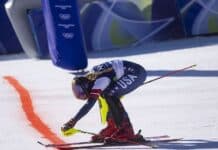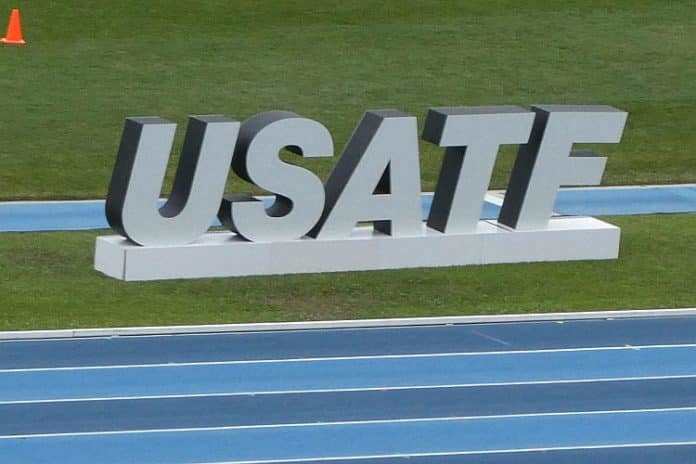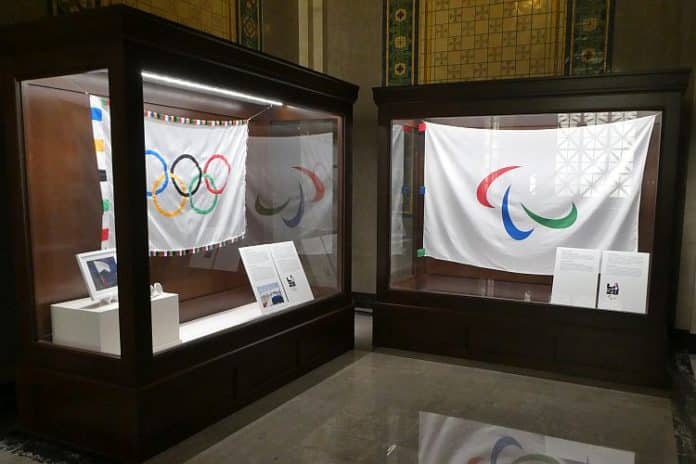★ The Sports Examiner: Chronicling the key competitive, economic and political forces shaping elite sport and the Olympic Movement.★
★ To get the daily Sports Examiner Recap by e-mail: sign up here! ★
≡ SEMENYA vs. WORLD ATHLETICS ≡
South African attorney Patrick Bracher told The Associated Press on Thursday that two-time Olympic women’s 800 m champion Caster Semenya will no longer pursue her claims against World Athletics sex-screening regulations in court:
“Caster’s legal challenge reached the highest possible court with a highly successful outcome and will not be taken further in the circumstances.”
Thus ends a seven-year, unsuccessful attempt to force World Athletics to change its handling of athletes with “differences in sex development” (“DSD”) in women’s competitions, but one in which she raised consciousness of the issue significantly (Semenya is not transgender).
After having lost twice, starting with the Court of Arbitration for Sport, Semenya turned to the European Court of Human Rights. In a closely-watched case in July, the Grand Chamber of the European Court of Human Rights granted her a “more rigorous review” at the Swiss Federal Tribunal, but she is now abandoning that effort.
In brief:
● CAS rejected the case in a lengthy opinion in April 2019, with the outcome summarized as:
“[T]he majority of the Panel accepts that the IAAF has discharged its burden of establishing that regulations governing the ability of female athletes with 46 XY DSD to participate in certain events are necessary to maintain fair competition in female athletics by ensuring that female athletes who do not enjoy the significant performance advantage caused by exposure to levels of circulating testosterone in the adult male range do not have to compete against female athletes who do enjoy that performance advantage.”
● Semenya appealed to the Swiss Federal Tribunal in May 2019, which decided in August 2020 that it “dismissed the appeal, concluding that the impugned award was not incompatible with substantive public policy.”
● Semenya then filed an appeal with the European Court of Human Rights in May 2021, summarized as:
“It would therefore appear that, as formulated in her application, the applicant’s complaint, based without distinction on Article 6 § 1 and Article 13, concerns the alleged insufficiency of the Federal Supreme Court’s review of the CAS award.”
● In July 2023, a deeply-divided ECHR ruling held for Semenya in one area:
“The Court found in particular that the applicant had not been afforded sufficient institutional and procedural safeguards in Switzerland to allow her to have her complaints examined effectively, especially since her complaints concerned substantiated and credible claims of discrimination as a result of her increased testosterone level caused by differences of sex development (DSD).”
● Switzerland appealed in October 2023, asking for a Grand Chamber hearing in front of a panel of 17 judges. A hearing was held on 15 May 2024 and the 15-2 decision was issued on 10 July, including:
“238. In sum, the specific characteristics of the sports arbitration to which the applicant was subject, entailing the mandatory and exclusive jurisdiction of the CAS, required an in-depth judicial review – commensurate with the seriousness of the personal rights at issue – by the only domestic court having jurisdiction to carry out such a task. The review of the applicant’s case by the Federal Supreme Court, not least owing to its very restrictive interpretation of the notion of public policy, which it also applied to the review of arbitral awards by the CAS, did not satisfy the requirement of particular rigour called for in the circumstances of the case. In these circumstances, the Court concludes that the applicant did not benefit from the safeguards provided by Article 6 § 1 of the Convention [for a fair and public hearing].”
So, Semenya’s next step would have been a return to the Swiss Federal Tribunal to request a “more rigorous review” of her case.
She has declined to do so and there are good reasons for this:
● The Swiss Federal Tribunal already issued a 71-page review of her prior case, and would have been highly likely to have come to the same conclusion – in agreement with the Court of Arbitration for Sport – but at greater length and with more discussion and citations.
● Although she was granted €80,000 (about $94,940 U.S.) for expenses, she had asked for €482,514 (~$566,592), and another appeal would cost more.
● The World Athletics regulations that she contested have been changed considerably and are much more stringent, to the point of now requiring all athletes who wish to compete as women to take a once-in-a-lifetime, yes-or-no, SRY-gene test via cheek swab or blood sample. If the Y-gene is found, it is now considered near-certain ineligibility to compete in the women’s classification.
● The research and scientific data about DSD athletes (and transgender women) competing in the women’s category has increased considerably, to be point where International Olympic Committee President Kirsty Coventry (ZIM) has empaneled an undisclosed panel to consider “protection of the women’s category.”
Time, research and concern over even small advantages in ultra-competitive sports like track & field, have caused many International Federations to adopt strategies similar to World Athletics.
Semenya’s all-time best was 1:54.25 from 2018, still no. 4 on the all-time list. If her naturally-occurring DSD condition was worth even a 1% advantage, that’s 1.14 seconds. That would reduce her best to 1:55.39 … or 17th on the all-time list.
It’s that close. And that 1:55.39 would have kept her out of the medals at the women’s 800 m final at the 2025 World Athletics Championships in Tokyo.
¶
There is an important postscript to Semenya’s case and it was stated by the Court of Arbitration for Sport in its lengthy 2019 summary of its original holding in the case:
“In its Award the Panel expressly pays tribute to Ms. Semenya’s grace and fortitude throughout this process. The Panel expresses its profound gratitude for her dignified personal participation and the exemplary manner in which she has conducted herself throughout the proceedings.
“The Panel also stresses that while much of the argument in this proceeding has centered around the “fairness” of permitting Ms. Semenya to compete against other female athletes, there can be no suggestion that Ms. Semenya (or any other female athletes in the same position as Ms. Semenya) has done anything wrong. This is not a case about cheating or wrongdoing of any sort. Ms. Semenya is not accused of breaching any rule. Her participation and success in elite female athletics is entirely beyond reproach and she has done nothing whatsoever to warrant any personal criticism.”
In a world going crazy, day by day, there is a need to honor class, dignity and fortitude. Semenya, now 34, has shown those in both her athletic career and in her activism. Both indicate we will hear more from her, in other arenas, in the years to come.
¶
★ Receive our exclusive, weekday TSX Recap by e-mail by clicking here.
★ Sign up a friend to receive the TSX Recap by clicking here.
★ Please consider a donation here to keep this site going.
For our updated, 699-event International Sports Calendar for 2025, 2026 and beyond, by date and by sport, click here!

























